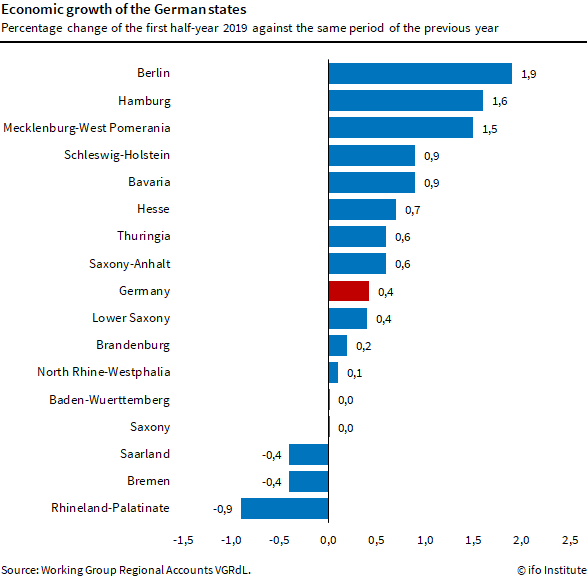ifo Institute: Industrial German Länder Are Suffering
Export-dependent German federal states with a strong industrial base are being hit particularly hard by the current downturn, according to figures from the ifo Institute. While the service metropolises of Berlin and Hamburg were able to expand their economic output by 1.9 and 1.6 percent respectively in the first half of 2019, the economy shrank by 0.9 percent in Rhineland-Palatinate and by 0.4 percent both in Bremen and in Saarland. Baden-Württemberg stagnated at 0.0 percent.
“The weakness of the global economy is weighing particularly heavily on Länder whose companies export a large proportion of the goods they produce,” says Robert Lehmann, a business cycle expert at the ifo Institute. The Länder of Baden-Württemberg, Lower Saxony, and Saxony, which are highly specialized in vehicle manufacturing, also grew less than the German average. “Bavaria, meanwhile, is managing to offset the weakness of the automotive industry with other sectors of the economy,” Lehmann says.
“Länder whose economic structure is based heavily around the service sector, on the other hand, such as Berlin, Hamburg, and Mecklenburg-Western Pomerania, have hardly felt the weakness of the global economy,” Lehmann adds.
“As things stand, there is no end in sight to the recession in German industry,” he continues. “This means that economic growth rates among the Länder are likely to drift apart quite substantially in 2019 overall. Berlin and Hamburg should hold their own at the top, while Bremen and Rhineland-Palatinate are expected to bring up the rear in western Germany, most probably along with Saxony and Brandenburg in eastern Germany.


